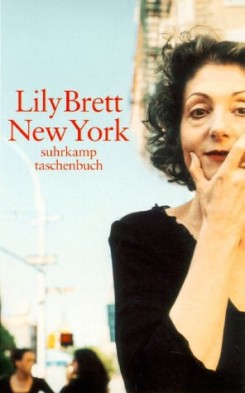New York
Tags Holocaust Memoir New York Travel
- Author: Lily Brett
- Year of publication: 2001
- Publisher: Picador
- Fiction / non: Non-fiction
- Recent / classic: Recent release
- Primary Category: Memoir
- Additional categories: Travel, Memoir
This book would appeal to you if
you enjoy reflections about life that focus on the minutiae and the absurd.
You probably wouldn't like this book if
you have no understanding about or sympathy for neurosis.
The key themes of this book are
New York
Family
Women
Health
Personal reflections about life
Personal neuroses
The writing style is
clipped and direct.This book is recommended as therapy because
Lily Brett’s reflections about life — in this case, life in New York — are witty, amusing to hilarious, and apt. Aside from enjoying her piquant observations, I read Lily Brett because she makes me feel much less neurotic, by comparison.
The intended audience for this book is
anyone with a penchant for the absurd. Also, anyone with neurotic tendencies.
Quotes
‘I feel almost nostalgic for the old days. For the coke and crack dealers who terrified me. I remember trying to look benign when I passed them on Eleventh Street. I didn’t want to be mistaken for a client or a cop.’
‘All of us have something that keeps us from being where we dream of being.’
‘A sign in a local café haunted me for a long time. Missing, the sign said. Three-legged black and white mongrel. Blind in one eye, damaged tail. Missing one ear. Castrated last week. Answers to “Lucky”. A photograph of Lucky, looking not too beleaguered, accompanied the notice.’
‘A friend of mine was rushed to New York Hospital with appendicitis. As soon as I heard the news, I developed pains in the right side of my abdomen.
I panicked. Until I remembered I’d had my appendix removed, years ago.
I get other people’s aches and twinges. I get their inflammations and itches and spasms. I’m so suggestible I can pick up other people’s lisps.’
‘”That’s because you was always such a big type,” he says. You was a stocky, stubby girl.”
I don’t like his choice of words. I feel hurt. I decide it is his English. My father, a Polish-Jewish refugee to Australia, has never really mastered some of the subtleties of the language.
“I wasn’t stocky,” I answer. “I never had broad shoulders.”
“It’s not necessary to have broad shoulders to be stocky,” he tells me. He sighs. “Why are we talking about this,” he says. “I rang to tell you that I miss you and I love you. When are you coming to Australia?”
“I wasn’t stocky,” I repeat. “And I wasn’t stubby. I was always tall. You can’t be stubby and tall.”
“You was stubby and chunky,” he replies. I am reminded that tact has never been one of my father’s strong points.’

